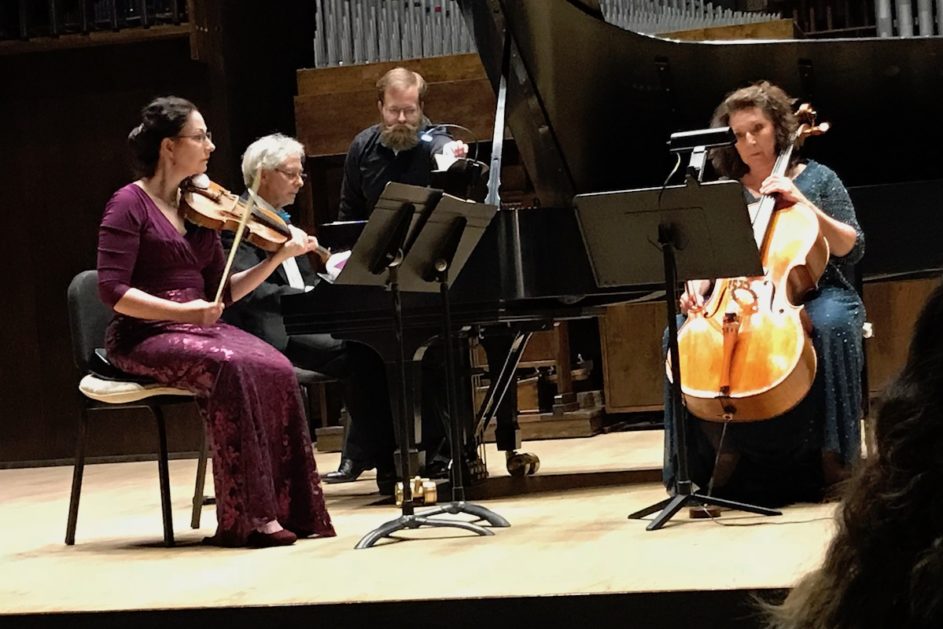While a lot of people around town weren’t having a very happy weekend, two area concerts were satisfying to the soul.
Saturday night at the Clayton Center for the Arts on the campus of Maryville College, Trillium, the delightful piano trio of violinist Alison Maerker Garner, cellist Alicia Randisi-Hooker and pianist Robert Bonham, played a wonderful concert that spanned 200 years of classical music tradition.
Trillium began their program with a glorious performance of Wolfgang Amadeus Mozart’s “Trio in B Flat,” K. 502, written in 1786.
Mozart was on a roll in 1786, his most productive year. His great opera, “The Marriage of Figaro” had been a huge success in May. He also wrote three of his greatest piano concerts and three trios, including the “B Flat.”
After hearing Mozart’s “Figaro” opera, Holy Roman Emperor Joseph II complained to Mozart that his music had too many notes.
Mozart didn’t take him seriously. Because in the “B Flat,” Trillium pianist Bonham hardly had a moment’s rest. Playing in a pure classical style, without much use of the sustain pedal that blends notes together, Bonham gave each on its own crisp identity.
But the “B Flat” is more than just a rush of notes. Each phrase must be carefully shaped. In the second movement the melody is passed back and forth between Bonham’s piano and Garner’s violin.
Mozart’s sense of humor could be heard in the little skipping phrases in the piano. In the third, Garner’s violin laughed out loud while Randisi-Hooker’s cello kept everything from getting out of hand.
But it was the deep emotions of British composer Rebecca Clarke’s “Trio” that made the trip to Maryville memorable. Written in 1921, it is intensely personal writing that begins dramatically with the chaos of being huddled in the darkness during German bombing attacks.
In the third movement, one can hear Clarke going out in the early morning light to survey the damage from the night before.
There’s also the hustle and bustle of trying to put life back together, all of which was brilliantly played by Trillium.
During Clarke’s day, music composition was exclusively a man’s world. Clarke largely sacrificed her own ambitions to aid the success of her husband, composer and pianist James Friskin, who later became a founding member of the Juilliard School faculty in New York.
However, performances like the Trillium’s on Saturday night are helping Clarke’s music establish its rightful place among significant British composers.
Trillium wrapped up its concert with polymath composer Paul Schoenfield’s “Café Music,” written in 1986.
Essentially a brilliantly constructed mash-up of Broadway show tunes, jazz and pop music smashed into a classical format, it was equally brilliantly played by Trillium.

The Tesla String Quartet includes Ross Snyder, Michelle Lie, Serafim Smigelskiy and Edwin Kaplan.
Sunday afternoon, at the Pollard Auditorium in Oak Ridge, the young and gifted Canadian musicians of the Tesla Quartet, along with oboe virtuoso, Thomas Gallant, performed another concert of stimulating music.
Named after the Serbian-American inventor and electrical engineer, Nikola Tesla, who brought life into modernity with the invention of AC electrical supply system, the Tesla Quartet’s objective is to bring emotional energy to the concert hall.
The quartet’s violinists, Ross Snyder and Michelle Lie, alternately joined violist Edwin Kaplan, cellist Serafim Smigelskiy and oboist Gallant for lovely performances of two movements from J. S. Bach’s 1776 “Oboe Quartet in B Flat Major,” WB60, Edward Elgar’s short 1878 “Andante and Allegro for Oboe and String Trio” and Mozart’s luminous 1871 “Oboe Quartet in F Major,” K370, all wonderfully played.
But it was the string quartet’s glowing performance of Claude Debussy’s 1893 “String Quartet in G Minor,” Op. 10, that found a place in my memory.
Debussy’s only string quartet, written when he was just 31, is Debussy’s musical response to French impressionist painting, the concept of painting light instead of sharply focused images.
It is Debussy using sound as light.
The Tesla Quartet played it brilliantly. The second movement pizzicato, the technique of plucking the strings instead of bowing them, sparkled like the first light of sunrise on water.
In the third movement, the quartet’s played so softly it was barely audible, an extremely difficult technique that demands enough pressure on the strings to keep the bow from skipping, but gentle enough to make the strings whisper.

Tesla Quartet is joined by guest oboist Thomas Gallant playing Bach’s Oboe Quartet.

